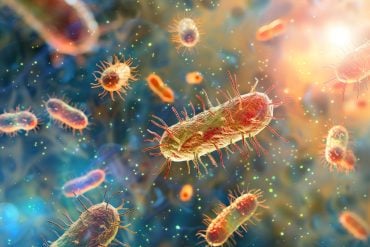Summary: A study of marmoset monkeys reveals a genetic variation of the SLC6A4 repeat region may contribute to anxiety via neurochemical changes in brain areas associated with emotional processing.
Source: University of Cambridge
A new study in marmoset monkeys suggests that individual variation in genes alters our ability to regulate emotions, providing new insights that could help in the development of personalized therapies to tackle anxiety and depression.
Some individuals are at greater risk of developing anxiety and depression than others and this depends in part upon the interaction between our genes and our environment, such as stressful or adverse events in our lives. Moreover, some of those who develop anxiety or depression may respond better to treatment while others struggle to benefit.
Although much research has been dedicated to finding effective treatments, we still have a poor understanding of how mental health disorders such as these develop and of the underlying brain mechanisms.
A study published today in PNAS has identified specific brain mechanisms that may underlie how genetic variation in the serotonin transporter gene, a key gene that regulates mood and stress responses, can influence the way we respond to a perceived threat.
In a previous study working with marmoset monkeys, Dr. Andrea Santangelo in the laboratory of Professor Angela Roberts at the University of Cambridge showed that the particular variant of the gene carried by a monkey will influence whether it perceives an ambiguous stimulus as being a high or low threat. This characteristic of an individual’s personality is called ‘trait anxiety’.
High trait anxiety is a risk factor in humans for developing anxiety and mood disorders, and genetic variation in the serotonin transporter gene has been linked with an increased likelihood of developing these disorders.
In this earlier study, the researchers showed that variants of the gene also affected how a monkey responds to certain medicines. Specifically, individuals carrying the variant of the gene associated with high anxiety actually increased their anxiety towards a threat immediately after treatment with a commonly-used antidepressant known as a ‘selective serotonin reuptake inhibitor’, or SSRI. This so-called ‘anxiogenic’ effect is often seen in patients in the early stages of treatment and is thought to be part of the reason why these patients do not respond favorably to SSRIs.
In this new study, Dr Santangelo and Professor Roberts, along with colleagues including those at the Wolfson Brain Imaging Centre and Translational Neuroimaging Laboratory, have revealed how variation in the serotonin transporter gene has an impact on the number of a specific type of serotonin receptor, known as the type 2A receptor, in a specific brain area. Receptors are proteins in the brain that enable particular molecules – in this case, serotonin – to affect the function of nerve cells. Monkeys carrying the variant of the gene associated with high anxiety had lower numbers of this receptor, hence changing the way in which serotonin-based drugs act upon them.

Medicines targeting these receptors have recently been used in the treatment of anxiety and mood disorders, so these findings suggest that it could be important in the future to know what variant of the serotonin transporter gene an individual is carrying when deciding on a treatment strategy.
The specific brain area where the number of receptors was reduced was the insula cortex, an important site for integrating information about sensations coming from the body with cognitive information processed in other areas to generate feelings and self-awareness, and to help guide decision-making.
This new finding suggests that those cognitive behavioural therapies (CBT) that focus on controlling sensations from the body could help patients in whom SSRI drugs are not effective.
“As many as one in three people affected by anxiety and depression does not respond to anti-depressants, so we need to find better treatments to help improve their quality of life,” says Dr Santangelo from the Department of the Physiology, Development, and Neuroscience at the University of Cambridge.
“Our research suggests that differences in our DNA may help predict which of us will respond well to these medicines and which of us require a different approach. This could be assessed using genetic testing.”
The research was carried out using marmoset monkeys because this type of genetic variation in the serotonin transporter gene is only present in humans, apes and monkeys, and not rodents. Moreover, the marmoset’s brain shares many similarities with the human brain, so using monkeys in research allows us to identify exactly which mechanisms are behind conditions such as anxiety and depression, helping inform the development of much needed new treatments.
Funding: The research was funded by the Medical Research Council.
Source:
University of Cambridge
Media Contacts:
Craig Brierley – University of Cambridge
Image Source:
The image is in the public domain.
Original Research: Closed access
“Insula serotonin 2A receptor binding and gene expression contribute to serotonin transporter polymorphism anxious phenotype in primates”. Andrea M. Santangelo, Steve J. Sawiak, Tim Fryer, Young Hong, Yoshiro Shiba, Hannah F. Clarke, Patrick J. Riss, Valentina Ferrari, Roger Tait, John Suckling, Franklin I. Aigbirhio, and Angela C. Roberts.
PNAS. doi:10.1073/pnas.1902087116
Abstract
Insula serotonin 2A receptor binding and gene expression contribute to serotonin transporter polymorphism anxious phenotype in primates
Genetic variation in the serotonin transporter gene (SLC6A4) is associated with vulnerability to affective disorders and pharmacotherapy efficacy. We recently identified sequence polymorphisms in the common marmoset SLC6A4 repeat region (AC/C/G and CT/T/C) associated with individual differences in anxiety-like trait, gene expression, and response to antidepressants. The mechanisms underlying the effects of these polymorphisms are unknown, but a key mediator of serotonin action is the serotonin 2A receptor (5HT2A). Thus, we correlated 5HT2A binding potential (BP) and RNA gene expression in 16 SLC6A4 genotyped marmosets with responsivity to 5HT2A antagonism during the human intruder test of anxiety. Voxel-based analysis and RNA measurements showed a reduction in 5HT2A BP and gene expression specifically in the right posterior insula of individuals homozygous for the anxiety-related variant AC/C/G. These same marmosets displayed an anxiogenic, dose-dependent response to the human intruder after 5HT2A pharmacological antagonism, while CT/T/C individuals showed no effect. A voxel-based correlation analysis, independent of SLC6A4 genotype, revealed that 5HT2A BP in the adjacent right anterior insula and insula proisocortex was negatively correlated with trait anxiety scores. Moreover, 5HT2A BP in both regions was a good predictor of the size and direction of the acute emotional response to the human intruder threat after 5HT2A antagonism. Our findings suggest that genetic variation in the SLC6A4 repeat region may contribute to the trait anxious phenotype via neurochemical changes in brain areas implicated in interoceptive and emotional processing, with a critical role for the right insula 5HT2A in the regulation of affective responses to threat.






